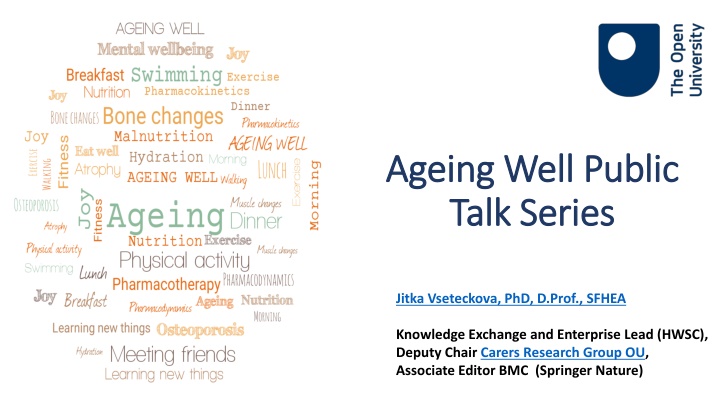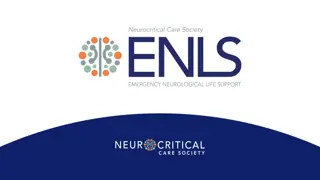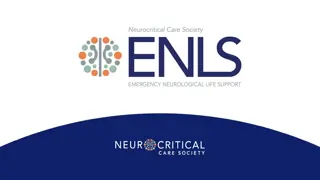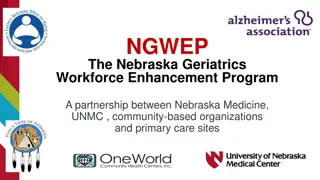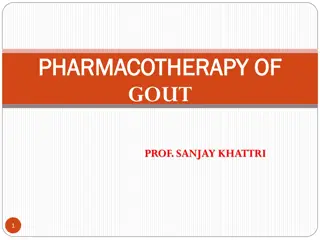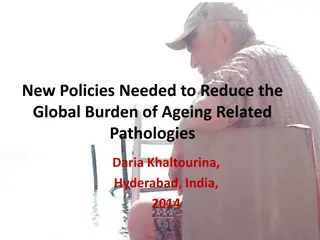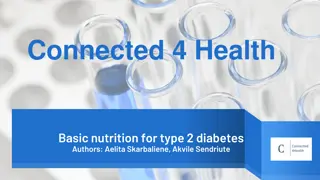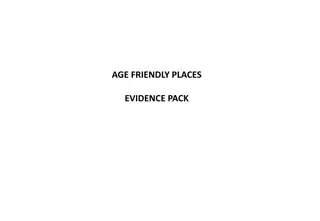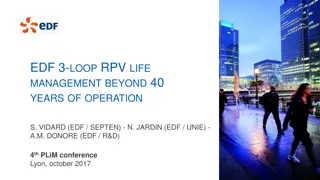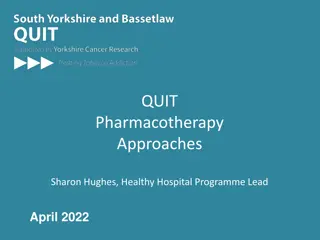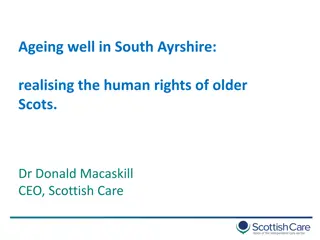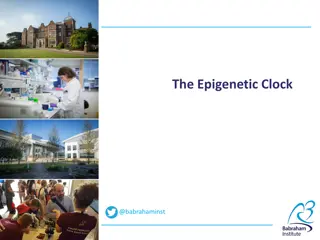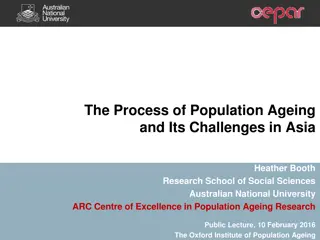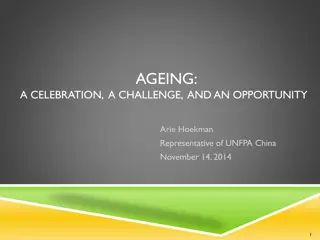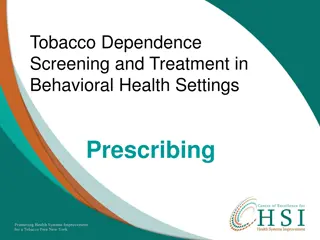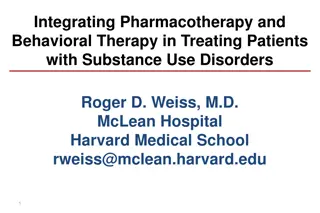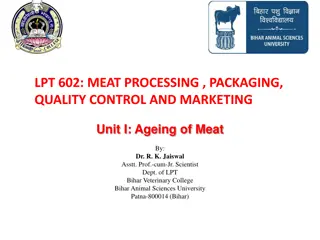Ageing Well: Understanding Nutritional Needs and Pharmacotherapy
Ageing well involves addressing nutritional needs and understanding the impact of pharmacotherapy on the ageing process. Factors like physiological changes, comorbidities, dehydration, and malnutrition play a crucial role. It is essential to consider the five pillars of ageing well, including physical, social, cognitive stimulation, nutrition, and hydration. Knowledge of biology and ageing helps in managing age-related cardiovascular changes and drug clearance. Regular exercise is emphasized to mitigate the effects of ageing on the body.
Download Presentation

Please find below an Image/Link to download the presentation.
The content on the website is provided AS IS for your information and personal use only. It may not be sold, licensed, or shared on other websites without obtaining consent from the author.If you encounter any issues during the download, it is possible that the publisher has removed the file from their server.
You are allowed to download the files provided on this website for personal or commercial use, subject to the condition that they are used lawfully. All files are the property of their respective owners.
The content on the website is provided AS IS for your information and personal use only. It may not be sold, licensed, or shared on other websites without obtaining consent from the author.
E N D
Presentation Transcript
Ageing Well Public Ageing Well Public Talk Series Talk Series Jitka Vseteckova, PhD, D.Prof., SFHEA Knowledge Exchange and Enterprise Lead (HWSC), Deputy Chair Carers Research Group OU, Associate Editor BMC (Springer Nature)
Five pillars facilitating Ageing Well Physical stimulation Social stimulation Cognitive stimulation Nutrition Hydration
Pharmacotherapy while ageing Pharmacotherapy while ageing Changes related to physiological ageing (muscle, metabolism, kidney, liver) Comorbidity / poly-morbidity resulting in poly-pharmacy Dehydration Malnutrition/undernutrition Pharmacokinetics Pharmacodynamics Polypharmacy & drug interaction & severe drug side effects Exercise & Five Pillars of Ageing Well THE LESS TIME THE DRUG STAYS IN THE BODY THE BETTER
Biology & ageing Biology & ageing Age-related CARDIO-VASCULAR CHANGES decrease in the overall blood flow heart rate, heart function, flexibility of vessels and arteries LOWER HEART RATE AT REST Decrease in kidney function and liver blood flow As a consequence, drug clearance decreases Mechanisms of changes in basal metabolism during ageing. A considerable number of physiological functions are known to show a gradual decline with increasing age Muscle mass and total body water are reduced, which can affect pharmacokinetics, especially of hydrophilic drugs- water soluble drugs Conversely, body fat increases from 20 to 40% with age, affecting absorption and metabolism especially of lipophilic drugs fat soluble drugs DEHYDRATION & LACK OF EXERCISE
TO SUM UP Many of the effects of aging on the heart and blood vessels can be reduced, slowed down by regular exercise Helps people maintaincardiovascular fitness as well as muscular fitness as they age. EXERCISE is beneficial regardless of the age at which it is started. Dehydration
Impact of ageing on the drug journey and its Impact of ageing on the drug journey and its action action Image result for pharmacokinetics adme
Drug journey Drug journey Absorption Elimination Distribution Metabolism
Drug absorption Drug absorption Ageing may slow down the rate at the which drugs are absorbed, but it is rarely considered clinically significant. However, absorption might be influences by our nutrition, hydration, physical activity, sleep and what else we do (e.g. smoking). Drug distribution Drug distribution Decreased muscle mass and dehydration leads to higher concentration of water soluble drugs for a given dose. Lipophilic drugs concentrate in adipose tissue and the brain. Drugs are slower to clear from fatty tissue accumulation more likely, CNS effects. Certain drugs are highly protein bound. Liver damage and malnourishment lead to lower circulation proteins and increase in concentration of drug. Blood flow to tissues and organs and active uptake of drugs into tissues may also be influenced by ageing. The blood-brain barrier may be more permeable as we age.
Drug metabolism Drug metabolism The liver is the major organ responsible for drug metabolism. Some amount of age-related decline due to reduced hepatic volume and reduced activity of certain hepatic enzymes is possible especially in conjunction with dehydration and sedentary lifestyle. Could be significant in case of liver disease. Ability of the liver to withstand stress decreases increased injury due to hepatotoxic medicines. Some drugs have the ability to induce or inhibit enzymes. Liver function is not easily measurable.
Drug elimination Drug elimination Excretion via the kidneys is the most significant age related change kidney function is measurable. Slowed clearance leads to accumulation can happen very slowly and signs of toxicity may take a while to appear. Certain drugs rely on good renal functioning to exert their effect. Some drugs are actually nephrotoxic and the overall risks and benefits may need balancing. Regular blood tests support decision making on dose and appropriateness. Older people are at a higher risk of acute kidney injury occurs quickly but can be managed if identified early. Causes can include dehydration, acute illness, infection, drug interactions.
Kidney and age related changes Kidney and age related changes Irreversible structural and functional changes - loss of renal mass due to glomerular loss Ability to secrete potassium and excrete hydrogen is impaired Reduction in renal blood flow Clearance in the aged kidney is also reduced These changes impair the ability of the kidney to control water and electrolyte balance, predisposing to dehydration and electrolyte abnormalities, particularly in situations of physiological stress.
Pharmacodynamics Pharmacodynamics Drug action in the body is affected by receptor binding, post receptor effects, and chemical interactions, residence time. Pharmacological effect can be therapeutic or undesirable (side effects and drug interactions). Homeostatic changes associated with ageing can be manageable until the introduction of a medicine. Ageing and polypharmacy increases the risk of adverse drug reactions (ADRs) and exacerbations of chronic conditions. The consequences are more serious in older people ADRs account for 5-17% of hospital admissions. Balancing the risks and benefits of prescribing in the older population is an art not a science!
STANDING UP / SITTING DOWN Raising up principle - STRAIGHTENING YOUR SPINE Proprioception feeling different parts of your feet on the floor Slightly pressing the inner side of your foot to the floor Stretching your toes Pushing yourselves away from the ground Moving head or arms should not necessarily change the way we stand
Drug related problems in older adults Drug related problems in older adults Dehydration Overuse polypharmacy may lead to cumulative effect TOXICITY (brain, kidneys, CV system, liver) Inappropriate prescribing (inappropriate prescribing can be defined as prescribing drugs whose use should be avoided because their risk outweighs their potential benefit) - may lead to cumulative effect TOXICITY (brain, kidneys, CV system, liver) Underuse or omission may not get you treated for the specific condition
It doesnt work!!! the same drug and the same amount of it can take longer to take its effect when we are older wait for it don t take another pill TOXICITY (brain, kidneys, CV system, liver). Diuretics A study showed that 25% of the adverse drug reactions reported in an older adult population were related to diuretic therapy, and all those admitted to hospital with medication-related falls were on diuretics. Dehydration of as little as 2% of total body water can result in a significant impairment in physical, visuomotor, psychomotor and cognitive performances.
Drug related effects in the older adults Drug related effects in the older adults Analgesia & increased sedation Decreased BP, decreased heart rate Vasoconstriction / vasodilatation blood circulation not ideal Psychomotor dysfunction, confusion Sedation, slowed reaction time & LACK OF EXERCISE Dizziness, worsened coordination Massively increased risk of falls!!!!! More regular blood tests by the GP might be desirable.
Accumulation of Accumulation of age related changes age related changes results: results: Drugs take longer to act and stay for longer (2 3 times) Dependence withdrawal syndrome Limited mobility, limited Drugs accumulation & drug to drug interaction Independence, limited engagement as cognitive functions and/or attention span may be impaired Increased sedation effect Increased risk of falls and fractures Adding DEHYDRATION and LACK OF EXERCISE Cognitive dysfunction
Hormonal changes associated with ageing Hormonal changes associated with ageing Affect fluid and electrolyte homeostasis electrolyte abnormalities usually caused by loss of bodily fluids& dehydration & use of diuretics (symptoms include: irregular heartbeat, fatigue, lethargy, nausea, diarrhoea) can easily lead to falls Antidiuretic hormone ADH - in older adults there is loss of the nocturnal rise in ADH, high prevalence of nocturia
The thirst response while ageing The thirst response while ageing Feel less thirsty Is blunted and we may forget to drink or not remember whether we drank Spontaneous consumption of fluids decreases Extreme vulnerability to dehydration in a state of physiological stress
Personalised Care Personalised Care Dosing & frequency. Regular blood tests & medication reviews to determine ongoing need, efficacy and potential harm. Combination of factors to consider physiology, multimorbidity, polypharmacy. Heath status can change quickly - symptom relief & quality of life v. prevention. Practical issues/inequalities dexterity, sight, cognition, swallow, housebound, complex regimens, adherence, carers Self management & shared decision making.
What we need to keep an eye on? What we need to keep an eye on? Alcohol Very little research has been done, and there are some particular problems for the older person. Alcohol may decrease treatment effect and increase side effect. Health problems in older age can make us more susceptible to alcohol and can interfere with the effectiveness of many medicines. Check with your doctor about whether it is safe for you to drink with your particular health problem or medication. Hidden dehydration
Drinking too much can damage many parts of the body and increase the risk of health problems including: Stomach lining ulcers or bleeding; Liver cirrhosis; Cancer mouth Malnutrition - alcohol has calories but can not provide the essential nutrients a balanced varied diet provides to keep us healthy. Excessive alcohol intake can also affect mental health including increasing anxiety, depression, confusion. Excessive alcohol intake is toxic to brain cells, and alcohol abuse leads to memory loss. Over time, alcohol abuse may also increase the risk of dementia.
Dehydration Dehydration Ageing produces a decrease in our thirst sensation so it is easy for dehydration to go unnoticed. So as we age, it is especially important to drink plenty of water and other non- alcoholic beverages. Early signs of dehydration include dizziness, tiredness, headaches, drowsiness, memory loss, and other symptoms that look like dementia. Long-term mild dehydration increases the risk of kidney stones, constipation and cholesterol problems, as well as diminished physical and mental performance. Severe dehydration can cause dementia like symptoms It s important to stay hydrated (aim for 6-8 cups per day, strict minimum 1.5 l / day). Be particularly vigilant if you take diuretics or laxatives or suffer from diabetes, high blood sugar, or diarrhoea.
Exercising regularly Exercising regularly Reduces bone loss and strengthen muscle reducing your risk of falling and fracturing bones Increases the metabolic rate Increases life expectancy Improves your sleep, mood and sense of well- being Helps protect against heart disease, stroke, diabetes, some cancers, depression and dementia Helps with joint stiffness and pain associated with arthritis Helps you to maintain a good appetite The more of the above the less medication you need.
Thank you for your attention Jitka evaluation Jitka.vseteckova@open.ac.uk
Summary of related resources to The Ageing Well Public Talk Series Summary of related resources to The Ageing Well Public Talk Series Podcasts Vseteckova J & King J (2020) COVID-19 Interview podcast for The Retirement Caf : Ageing Well Under Lockdown Vseteckova J & Broad E (2020) Podcast Open University & The Parks Trust Keep Me Walking - researching with people living with dementia and their carers Vseteckova J (2020) Podcast - Areas of research with The Open University Broad E, Methley A & Vseteckova J (2021) Podcast OU & The Parks Trust & Northamptonshire Healthcare NHS Foundation Trust - Spotter sheet and mindful walking. Vseteckova J, Methley A, Broad E (2021) Podcast OU & The Parks Trust & Northamptonshire Healthcare NHS Foundation Trust Preventing brain decline while ageing
Methley A, Broad E, Vseteckova J (2021) Podcast OU & The Parks Trust & Northamptonshire Healthcare NHS Foundation Trust Walking therapy Vseteckova J, Methley A, Broad (2021) Podcast OU & The Parks Trust & Northamptonshire Healthcare NHS Foundation Trust Understanding our memory Araya Y , Broad E, Vseteckova J (2022) Engaging with our environment Joannidi H, Araya Y, Broad E & Vseteckova J (2022) Sense of self during aging: how mindfulness and nature can help The above podcasts can be also seen on The Parks Trust YouTube Channel
OpenLearn Resources: Vseteckova J (2020) Ageing Well Public Talk Series https://www.open.edu/openlearn/health-sports- psychology/health/the-ageing-well-public-talks Vseteckova J (2019) 5 reasons why exercising outdoors is great for people who have dementia https://www.open.edu/openlearn/health-sports-psychology/mental-health/5-reasons-why-exercising- outdoors-great-people-who-have-dementia Vseteckova J (2019) Depression, mood and exercise https://www.open.edu/openlearn/health-sports- psychology/mental-health/depression-mood-and-exercise?in_menu=622279 Vseteckova J (2019) Five Pillars for Ageing Well https://www.open.edu/openlearn/health-sports-psychology/mental- health/five-pillars-ageing-well Vseteckova J (2020) Ageing Brain https://www.open.edu/openlearn/health-sports-psychology/health/the-ageing- brain-use-it-or-lose-it Vseteckova J (2020) Ageing Well Public Talks Series II. Plan for 2020 2021 https://www.open.edu/openlearn/health- sports-psychology/health/ageing-well-public-talk-series-plan-2020/2021
Vseteckova J, Broad E, Andrew V (2021) The impact of walking and socialising through 5 Ways Caf on people living with dementia and their carers: A volunteer s perspective https://www.open.edu/openlearn/health-sports- psychology/health/the-impact-walking-and-socialising-through-5-ways-cafe-on-people-living-dementia-and-their- carers Vseteckova J, Methley A, Lucassen M (2021) The benefits of mindfulness and five common myths surrounding it https://www.open.edu/openlearn/health-sports-psychology/mental-health/the-benefits-mindfulness-and-five- common-myths-surrounding-it Methley A, Vseteckova J, Broad E (2021) Outdoor Therapy: The Benefits of Walking and Talking https://www.open.edu/openlearn/health-sports-psychology/mental-health/outdoor-therapy-the-benefits-walking- and-talking Vseteckova J, Methley a, Broad E (2021) What happens to our brain as we age and how we can stop the fast decline https://www.open.edu/openlearn/health-sports-psychology/health/what-happens-our-brain-we-age-and- how-can-we-stop-the-decline Methley A & Vseteckova J & Jones K (2020) Green & Blue & Outdoor spaces https://www.open.edu/openlearn/health-sports-psychology/mental-health/the-benefits-outdoor-green-and-blue- spaces Vseteckova J, Borgstrom E, Whitehouse A, Kent A, Hart A (2021) Advance Care Planning (ACP ) - Discuss, Decide, Document and Share Advance Care Planning (ACP ) - Discuss, Decide, Document and Share - OpenLearn - Open University
Vseteckova J (2020) Walking the Parks with The OU and The Parks Trust https://www.open.edu/openlearn/health- sports-psychology/social-care-social-work/keep-me-walking-people-living-dementia-and-outdoor-environments Vseteckova J, Methley A, Broad E (2021) Understanding our memory What do we need to know about our memory? - OpenLearn - Open University Araya Y , Broad E, Vseteckova J (2022) Engaging with our environment https://www.open.edu/openlearn/health-sports-psychology/mental-health/engaging-our-environment-what-are-the- benefits Vseteckova J (2022) Pharmacotherapy while ageing https://www.open.edu/openlearn/health-sports- psychology/pharmacotherapy-while-ageing Joannidi H, Araya Y, Broad E & Vseteckova J (2022) Sense of Self during ageing how mindfulness and nature can help https://www.open.edu/openlearn/health-sports-psychology/sense-self-during-ageing-how-mindfulness-and-nature- can-help Mehta S (2022) Medicines and personalisation while ageing Medicines and personalisation - OpenLearn - Open University Gale B (2022) How can we prepare for death while ageing? Ageing Well Public Talk Series related - https://www.open.edu/openlearn/health-sports-psychology/health/valuing-death
COVID-19 related Vseteckova J, How to age well, while self-isolating (2020) https://www.open.edu/openlearn/health-sports-psychology/how-age-well- while-self-isolating Vseteckova J, (2020) SHORT FILM - Ageing Well in Self-Isolation https://youtu.be/LU4pXFgcGos Vseteckova J, (2020) ANIMATION - Keeping healthy in Self-Isolation https://youtu.be/M9yUC-MUugA Vseteckova J et al (2020) COVID-19 The effects of self-isolation and lack of physical activity on carers https://www.open.edu/openlearn/health-sports-psychology/social-care-social-work/the-effects-self-isolation-and-lack- physical-activity-on-carers Taverner P, Larkin M, Vseteckova J, et al. (2020) Supporting adult carers during COVID-19 pandemic https://www.open.edu/openlearn/health-sports-psychology/social-care-social-work/how-can-adult-carers-get-the-best- support-during-covid-19-pandemic-and-beyond Robb M, Penson M, Vseteckova J, et al. (2020) Young carers, COVID-19 and physical activity https://www.open.edu/openlearn/health-sports-psychology/social-care-social-work/young-carerscovid-19-and-physical- activity Penson M, Vseteckova J et al. (2020) Older Carers, COVID-19 and Physical Activity https://www.open.edu/openlearn/health-sports- psychology/social-care-social-work/older-carers-covid-19-and-physical-activity Vseteckova J & Methley A (2020) Acceptance Commitment Therapy (ACT) to help carers in challenging COVID-19 times https://www.open.edu/openlearn/health-sports-psychology/health/how-can-acceptance-and-commitment-therapy-help- carers-challenging-times-such-the-covid-19-pandemic
AGEING WELL PUBLIC TALK SERIES WEBSITE Ageing Well Public Talks Series 2022/2023 repository on ORDO Collections Ageing Well Public Talks Series 2021/2022 repository on ORDO Collections Ageing Well Public Talks Series 2020/2021 repository on ORDO Collections Ageing Well Public Talks Series 2019/2020 repository on ORDO Collections Midlife MOT OpenLearn Course OpenLearnCreate Course on Ageing Well 2019/2020 Home exercise no equipment no problem Blog
Ageing Well series of Public Talks 2022/23- topics Are we prepared to live longer? (Jitka Vseteckova & Catherine Pestano) September 14th 2022 Taking control of dying (Barbara Gale & Amanda Whitehouse) October 19th 2022 Memory and ageing (Jitka Vseteckova & Helen Joannidi & Ellie Broad) November 16th 2022 Equality, diversity & geography of ageing (Carlos M Lequizamon) December 14th 2022 General Practices COVID-19 and beyond (Andrew Potter) January 18th 2023 Living with diabetes and nutrition while ageing (Jitka Vseteckova & Alan Hastings) February 22nd 2023 Relationships and couple intimacy while ageing (Andreas Vossler) March 15th 2023 Lets talk about sleep (Abi Methley) April 19th 2023 Health Inequalities and Ageing (Sonal Mehta) May 17th 2023 Biomechanics of ageing (Jitka Vseteckova & David Curry) June 14th 2023 Ageing, later life and caring in LGBTQ communities (Joseph DeLappe & Tony Collins) July 12th 2023 Useful resources: https://ordo.open.ac.uk/collections/Ageing_Well_Public_Talks_2020-21/5122166 https://ordo.open.ac.uk/collections/Ageing_Well_Public_Talks_2021-22/5493216
